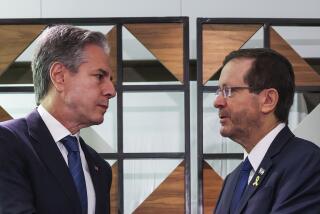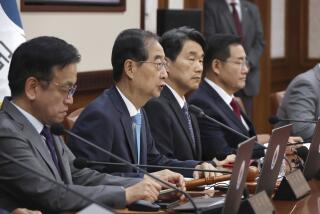S. Korea Accepts North’s Talks Proposal
- Share via
SEOUL — South Korea agreed Wednesday to North Korea’s proposal for high-level political and military talks to ease tension with the eventual goal of reuniting the rival nations after more than 43 years.
Prime Minister Kang Young Hoon accepted North Korea’s Nov. 16 proposal. He suggested in a letter to his North Korean counterpart, Yon Hyung Muk, that they head seven-member delegations to alternating talks in Seoul, capital of South Korea, and Pyongyang, capital of North Korea.
Kang offered to discuss the ending of mutual vilification, the building of “mutual trust in military matters” and promoting exchanges in various areas.
He also suggested discussing a meeting between South Korean President Roh Tae Woo and North Korean President Kim Il Sung.
Delivered at Panmunjom
“To wipe out mutual distrust and restore trust between them, the two Koreas should recognize each other’s ideologies and systems, conduct dialogue on the basis of mutual respect and non-interference and develop cooperative relations on the principle of mutuality,” Kang said in the letter, which was delivered to North Korea at the Panmunjom truce site in the demilitarized zone.
Kang also asked that preparatory contacts be made in Panmunjom in February to discuss procedural matters for the proposed prime ministers’ talks.
North Korea had proposed wide-ranging talks on reducing military strength, but South Korea did not mention troop reduction, and its proposal was more vague.
Kang specifically did not refer to Pyongyang’s proposal of discussions on the withdrawal of U.S. troops from South Korea. About 42,000 U.S. troops are in South Korea under a mutual defense pact.
He indirectly rejected North Korea’s bid for three-way talks by saying in his letter that Korean peace and unification are basically “our national problems that should be resolved between the two parties concerned.”
On Dec. 20, North Korea renewed its bid for tripartite talks involving the two Koreas and the United States to discuss an American pullout and a mutual reduction of the two Koreas’ armed forces. North Korea says the American military presence hinders Korean unification.
South Korea said the prime ministers should head the delegations, but North Korea had proposed deputy prime ministers. Procedural matters have been a major problem in arranging inter-Korean talks in the past.
The Koreas each have been pressing major initiatives to end their long, bitter confrontation.
Delegations of lawmakers from both sides planned to resume negotiations today in Panmunjom to clear the way for full-scale parliamentary talks on nonaggression and other matters. South Korea expects the full talks to be held next spring.
Talks held intermittently since 1972 on reducing tension failed to make progress.
Seoul officials have expressed mistrust about North Korea’s intentions. They say North Korea’s insistence on discussing withdrawal of U.S. troops indicates that Pyongyang may be using the talks to try to weaken South Korea.
The two Koreas have hundreds of thousand of troops facing each other along the 150-mile border. The border is sealed, and the only communication link is a hot line.
U.S. and Soviet forces divided the Korean Peninsula when they ended the Japanese occupation at the end of World War II in 1945. North Korea invaded South Korea in 1950, starting the three-year Korean War.
More to Read
Sign up for Essential California
The most important California stories and recommendations in your inbox every morning.
You may occasionally receive promotional content from the Los Angeles Times.










